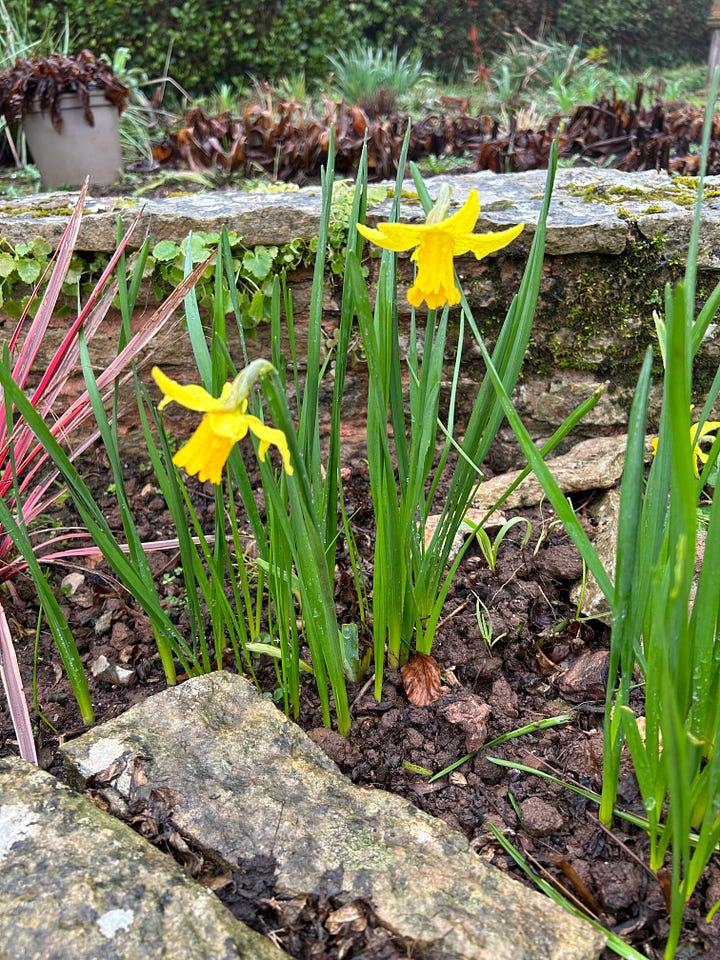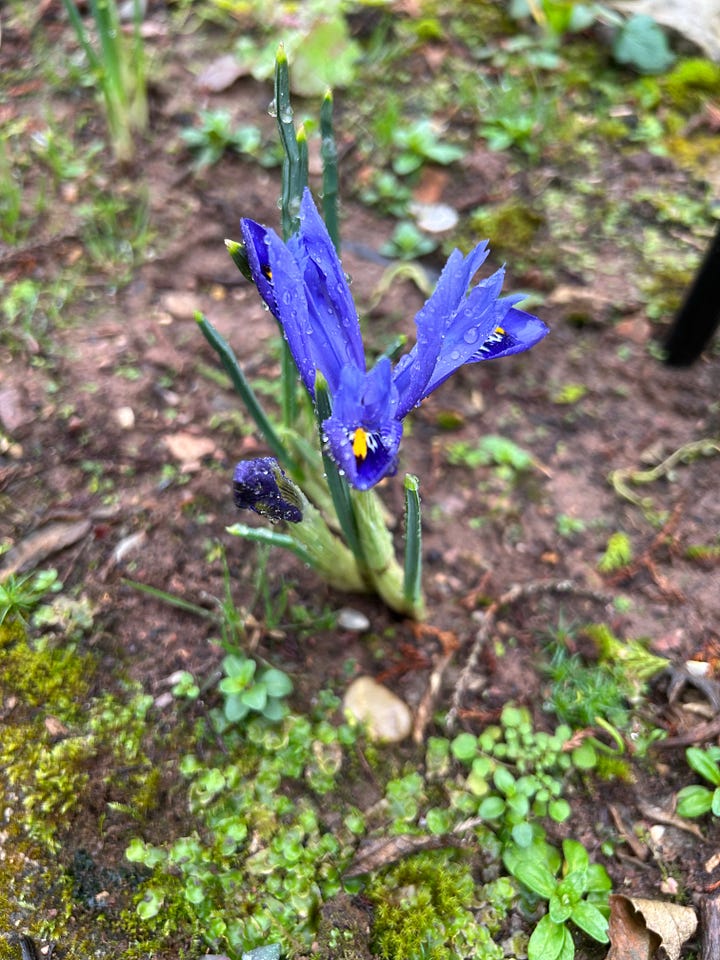"Anyone who keeps the ability to see beauty never grows old." - Franz Kafka.
Hello everyone! Welcome to new subscribers since last week - I’m glad to have you with us. It’s been a week of mostly wet and mistiness, the low cloud leaking a fine drizzle that coats and soaks everything. But there are daffodils beginning to flower, and iris reticulata, and coronilla and sweet box scent the air outside the front door, providing a gift of sweetness every time we go out. There is always some little thing of beauty in the garden.


The wet weather has meant plenty of time for knitting, and I have finished this zingy pair of yellow socks. The pattern is ‘Rocking Chair’ by Pauline Kuunsola and I knitted them from Laine’s ‘52 Weeks of Socks. Vol. 1’ - which is a joy of a book if you like knitting socks. The pattern is also available on the website Ravelry, which I won’t link to as some people find the layout and colours of the website difficult. The yarn is John Arbon Exmoor Sock and the colour way is ‘Drumble’. Drumble, I believe, is an old word for bumble-bee. Isn’t that lovely? The socks are soft and cosy and are things of significant beauty - and I MADE THEM MYSELF!
More beauty, in literature this time - have you ever read All Passion Spent by Vita Sackville-West? A short book, a novella, published in 1931, it is laced with insight and wisdom and escape and realisation. It is a book about being old, and it is a very fine book indeed. I read it first after watching a TV adaptation, probably forty years ago, and have regularly re-read it since.
It opens in 1931 with the widowing of Lady Deborah Slane, the eighty-eight year old wife of a former Prime Minister and Viceroy of India. As an intelligent, beautiful and creative young woman, she set aside a deep desire to be an artist in order to marry a great statesman and to have six children. Said children are mockingly drawn - pompous, pre-occupied with status and money, grasping and patronising to their mother, wanting to ‘manage’ her widowhood, see her acceptably ‘housed’, dividing up her remaining life into short periods spent with each of them in turn. But Lady Slane has other ideas. She has lived a life of conformity since her marriage at eighteen - supporting her husband’s career, moving around the world without demur, being charming and delightful and dutifully meeting every expectation required from the level of society in which she exists. In short, suppressing her self in service of her husband’s life, a ‘proper’ wife to a grand Edwardian gentleman in high public office. Lady Slane is liberated by her husband’s death (although she considers herself to have been fortunate in her marriage) and ignoring her children’s advice, sells the grand London house and rents a cottage in Hampstead - rather bohemian and ‘out in the country’ at the time, not the chi-chi haunt of the rich and famous that it is today. She moves into a small house that she first noticed over thirty years ago, and nursed an intention to one day live there. Accompanied by her ageing maid, Genoux, who has been with her since her time as the young Vicereine, she makes it clear that she desires no visits from her family - not her children, grandchildren or great grandchildren:
“I am going to become completely self-indulgent. I am going to wallow in old age. No grandchildren. They are too young. Not one of them has reached 45. No great-grandchildren either; that would be worse. I want no strenuous young people… for it would only remind me of the terrible effort the poor creatures will have to make before they reach the end of their lives in safety. I prefer to forget about them. I want no one about me except those who are nearer to their death than to their birth.”
The owner of the property, who becomes her landlord and her friend, is the aesthete, slightly fey, Mr Bucktrout, who brings her flowers from the garden and amuses her with his idiosyncratic talk about life and his predictions for the end of the world; and the builder, Mr Gosheron, an elderly craftsman who restores and redecorates the house and helps her in the garden. Both men are elderly, both have an eye for and a love of beauty in nature, in art and craft, and in character, and both recognise a kindred spirit in Lady Slane. Their companionable friendship becomes an important part of her new life. Also into this late life comes Mr Fitzgeorge, an eccentric, millionaire bachelor and art collector, who met Lady Slane many years previously, when she was a young wife in India, and he a young man smitten by her beauty. He has held a steadfast love for her ever since. These three elderly individuals (and they are very much individuals) become the safe and understanding friends with whom she can contemplate and reflect on long life:
“Had she been happy? That was a strange clicking word to have coined – meaning something definite to the whole English-speaking race… But one was happy at one moment, unhappy two minutes later… So what did it mean?… It seemed merely as though someone were asking a question about someone that was not herself, clothing the question in a word that bore no relation to the shifting, elusive iridescent play of life; trying to do something impossible, in fact, like compressing the waters of a lake into a tight, hard ball. Life was that lake, thought Lady Slane, sitting under the warm south wall amid the smell of the peaches; a lake offering its even surface to many reflections, gilded by the sun, silvered by the moon, darkened by a cloud, roughened by a ripple; but level always, a plane, keeping its bounds, not to be rolled up into a tight, hard ball, small enough to be held in the hand, which was what people were trying to do when they asked if one’s life had been happy or unhappy.”
The book is gentle, beautifully expressed, and there is no rush of plot or action, but much reflection, gaining of contentment and acceptance; of finding that it is possible to be your real self, even in the latest of late life.
I love this book. I admire the single-mindedness of Lady Slane in finally living her life in the way that she wants to. I love her gathering of disparate but like-minded strangers who become fast friends. I greedily revel in the shared wisdom of age and the quietness and the love. Vita Sackville-West was a young woman when she wrote All Passion Spent, but what a triumph she makes of it - her sensitivity is profound. In our own times when older age is mostly denigrated and dismissed, this little book is a wellspring of understanding and nuance. It is a celebration of life and the beauty of age:
“If one wanted beauty, one had only to rest one's eyes on her, so fine and old and lovely, like an ivory carving; flowing down like water into her chair, so slight and supple were her limbs, the firelight casting a flush of rose over her features and snowy hair. Youth had no beauty like the beauty of an old face; the face of youth was an unwritten page. Youth could never sit as still as that, in absolute repose, as though all haste, all movement, were over and done with, and nothing left but waiting and acquiescence.”
Isn’t that wonderful?
The title, All Passion Spent, is taken from the ending of Milton’s Samson Agonistes (1671):
His servants he with new acquist
Of true experience from this great event
With peace and consolation hath dismist,
And calm of mind, all passion spent.
These lines are describing blind Samson after he has pulled the pillars of the temple down on himself and his enemies, a heroic act of self-sacrifice. But although the three words in isolation are apt, there is no need for Lady Slane to feel that she has sacrificed herself. She has found her calmness by turning away from prestige and position and thoughtfully traversing her long past; reflecting and slotting times together, drawing in the focus on her life, remembering it as a ‘good’ whole. It’s a terrific book. If you haven’t read it, then I recommend it heartily, whatever your age or life-stage.
As mentioned above, the BBC made a wonderful adaptation of it in 1986 with Wendy Hiller as a rather beautiful and ethereal Lady Slane. It’s a joy of an adaptation, giving us the ghastly elderly children (Graham Crowden and Phyllis Calvert among them) with their social snobbery and insensitive bossiness, and Maurice Denham, David Waller and Harry Andrews as Bucktrout, Gosheron and Fitzgeorge respectively. All are a delight to watch, as venerable actors steeped in their craft so often are. It’s available on BBC Iplayer at the moment. I remember being captivated by it in 1986, and I was thrilled to see it there to watch again. I am possibly more moved by it now that I am older myself. Do watch it if you can see it where you are. And remember the words of Frank Lloyd Wright:
The longer I live, the more beautiful life becomes.’
That’s it for this week, my friends. I shall write again soon.







June, this was a beautiful post. And I absolutely loved hearing you read it. Also, those socks look amazing. I adore comfy socks. And of course, the fact that you made them yourself makes them even better. Quite glad to have met you earlier on office hours.
Sounds like a wonderful book. Will add to my list. 🙏